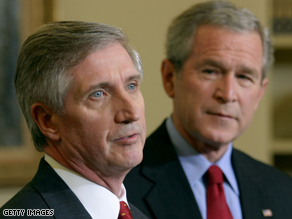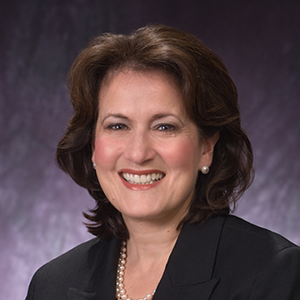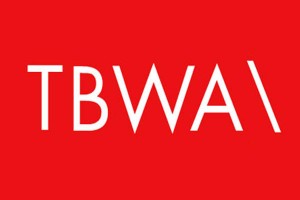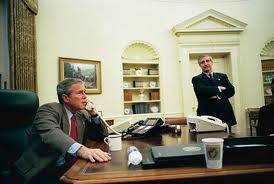[View the story "Passing the Puck in Therapeutic Hockey" on Storify]
Communication Chronicles 2011-04-26 20:06:32
April 26th, 2011 · Comments Off on Communication Chronicles 2011-04-26 20:06:32 · Comm361, Student Blog Posts
Tags:
Storify
April 26th, 2011 · Comments Off on Storify · Comm361, Student Blog Posts
Here’s the link to the Nova Cool Cats Tags:
Andrew Cards on Bush’s presidential terms
April 25th, 2011 · Comments Off on Andrew Cards on Bush’s presidential terms · Comm361, Student Blog Posts

“He faced unprecedented challenges,” explained Andy Cards, when asked about Bush’s 2000-2008 presidential terms during a C-SPAN video conference on April 7, 2011 with college students.
Cards, a close friend of the Bush family since his time at the Republican National Committee, served as chief-of-staff for President George W. Bush from 2001 to 2006. Both he and President Bush came into office without high expectations because the economy and national morale were not as high as they had been in the past. Because of Bush’s “courage to make tough decisions,” however, they were able to “restore faith, confidence, and responsibility” in the American people.
The most memorable event that demonstrated Bush’s powerful leadership was September 14, 2001 when he spoke about the Al-Qaeda attacks on the World Trade Centers in New York City and the Pentagon in Washington, D.C. He remained “cool, calm, collected and objective,” and “tried very hard not to allow emotion affect his decision making.” He knew that it was his duty to preserve, defend, and protect the American people, despite how unique and lonely that responsibility is.
Cards ended the conference by explaining how history will evaluate Bush’s presidential terms. He said that Bush would leave a legacy in the War in Iraq because he “brought democracy to that land, which was a very important contribution to that country. He also declared “history will be kinder [to Bush] than current events.”
Watch the full video conference at C-SPAN.com.
Tags:
C-Span: Anita McBride
April 25th, 2011 · Comments Off on C-Span: Anita McBride · Comm361, Student Blog Posts

ANITA MCBRIDE knows that the position of First Lady is “probably the most important and most demanding unpaid job in the world.” McBride was the White House Chief of Staff for the first lady from 2005-09 through 3 administrations: Reagan, Bush and Bush. She appeared on C-Span last week to talk to college students, including George Mason University’s.
First Lady Eleanor Roosevelt was the definer of the modern First Lady, says McBride, which means being an activist by using their voice and their platform for the significant social issues of the day.
Traditionally, the First Lady was seen as a homemaker and caretaker; McBride says that “the role of social hostess in our nation is very important; it’s important how we convey the use of the White House, not only to the Americans, but to our international visitors.” Even so, the role of First Lady has become more activist. The First Lady herself decides what social issues she takes on and how much she is involved in them, McBride says. “We expect First Ladies to be deeply engaged in the issues that they care about and issues that the nation cares about.”
The First Lady also humanizes the president in interviews by discussing the hardships her husband goes through and portraying the family side of him.
The job of First Lady is 24/7 but, as mentioned earlier, is not paid. Her staff, however, is paid because they are considered “staff of the office of the president of the United States assigned to the office of the First Lady.”
Tags:
C-SPAN: Former Chief of Staff Andrew Card
April 22nd, 2011 · Comments Off on C-SPAN: Former Chief of Staff Andrew Card · Comm361, Student Blog Posts

Former Deputy Chief of Staff under president George H. W. Bush and Chief of Staff under president George W. Bush, Andrew Card’s job was to inform the president of information that he needed to know, not information that he wanted to know.
And when he needed to interrupt president Bush during his visit to Booker Elementary School, he knew the news was not any that Bush wanted to hear.
“America is under attack” were the words that Card was so famously photographed whispering to Bush after the second New York City twin tower was hit by a plane hijacked by terrorists.
After initially believing that the first crash was a “horrible accident,” Card instantly knew who was behind these attacks.
Despite the shock of these tragedies, Card and Bush could not let their emotions get in the way of keeping the country stable. They needed to stay disciplined – in a cool, calm and collected manner.
Clearly realizing that the president was highly impacted by the situation, Card knew that Bush was focused on the unique and lonely responsibility of being the president of a devastated America.
Although Bush was in such a difficult position, Card watched him bring resolve and faith to the situation, something that Card admired him for.
Tags:
Tech Blog #14: Guest Speaker Rick Reo
April 21st, 2011 · Comments Off on Tech Blog #14: Guest Speaker Rick Reo · Comm361, Projeqt, Storify, Student Blog Posts
 David Lee, the co-founder and creative director of Projeqt.com, was supposed to be with us in class today, but wasn’t able to. Rick Reo, though, an instructional designer for GMU’s Division of Instructional Technology, was!
David Lee, the co-founder and creative director of Projeqt.com, was supposed to be with us in class today, but wasn’t able to. Rick Reo, though, an instructional designer for GMU’s Division of Instructional Technology, was!
TBWA Worldwide, a part of Omnicom Group Inc., is a global advertising agency that sponsors Projeqt.
“We wanted to make sure that it was usable by people with limited Web browsing knowledge,” said an employee via Skype. “You don’t have to be a super designer to use this.”
Along with many other personalization options, one can use either a grid mode or a linear mode when designing one’s project.
A lot more information on TBWA can be found here.
Projeqt – Interactive and Asthetically Appealing
April 21st, 2011 · Comments Off on Projeqt – Interactive and Asthetically Appealing · Comm361, Student Blog Posts
Tags:
Role of First Lady Self-Determined, McBride says
April 21st, 2011 · Comments Off on Role of First Lady Self-Determined, McBride says · Comm361, Student Blog Posts
Tags:
C-SPAN Video Conference with Andrew Card
April 21st, 2011 · Comments Off on C-SPAN Video Conference with Andrew Card · Comm361, Student Blog Posts
Former White House Chief of Staff Andrew Card defended the much-maligned presidency of George W. Bush in a video conference on April 7.

Card, who served under Bush for more than five years, joined students participating from the George Mason University Video Studio along with Steve Scully, the political editor for the C-SPAN networks, and students from the University of Denver to discuss his relationship with the controversial 43rd president, on both professional and personal levels.
“History will be kinder than current [attitudes],” Card said regarding Bush’s “misunderstood” time in office. “The president had to face unprecedented challenges,” including the terrorist attacks on September 11. It was Card who was faced with the unfortunate task of informing Bush of those tragic events while the president was with a classroom of second graders.
“The president had heard about a plane crash in New York,” Card recalled. Bush and his staffers initially thought it had to be an accident, with Card’s theory being that the pilot had a heart attack. But when Card was informed that the second tower of the World Trade Center had also been hit, he had to make a judgment call.
“It was very rare for me to walk into a room after the president had gone in,” Card said. The chief of staff is faced with the guideline of “Does the president need to know?” It was clear that the answer was yes in this case, so Card quickly approached Bush and whispered about the second crash, adding an “editorial comment” of “America is under attack.” He then leaned away so that Bush could not ask questions, but staffers got in contact with the FBI so that Bush could immediately talk to them once he was out of the classroom.
“I tried very hard on September 11th not to allow the emotion of the challenge get in the way of the responsibility that I had to help the president do his job,” Card said. He tried to remain “cool, calm and collective and objective” and feels the president did the same, although he was clearly emotionally affected by the tragedy. Card says that Bush’s mind likely went to the oath he took on Inauguration Day just eight months earlier.
Card also suggested that Bush was the most successful president ever in terms of saving lives (including his AIDS and malaria work in Africa) and spreading democracy. “I think history will be kinder to him when they come to recognize how difficult the challenges that he had to face were.”
The distance learning course, which is produced by C-SPAN, is a unique opportunity for students to interview guests via video conference. The course airs on C-SPAN3 on Fridays at 5 p.m. and also streams online (http://www.c-span.org/Distance_Learning/). The interview with Card can be viewed here.
Tags:
C-SPAN Video Conference # 2: Andrew Card
April 21st, 2011 · Comments Off on C-SPAN Video Conference # 2: Andrew Card · Comm361, online journalism, Student Blog Posts
One of a presidential chief of staff’s greatest challenges is deciding what is important for the president to know.
“Presidents, like everybody else, want to know everything,” said Andrew Card, former White House chief of staff for George W. Bush from 2000-2006. “It’s the chief of staff’s job to make sure that the president has what he needs – but not everything he wants — and that he focuses on real presidential decisions, rather than just government decisions.”
Card, who joined Steve Scully, the political editor for the C-SPAN networks, and participating students from George Mason University, Purdue University and the University of Denver for a live video conference on Apr. 7, provided a window into a chief of staff’s daily life.
“I would try to be at my desk at 5:30 in the morning,” Card said. “The first document that I would read would be the President’s Daily Brief, the PDB. That would be information and analysis that came from the CIA. Then I would read economic and domestic news.”
Card also kept constant tabs on the whereabouts of the first and second families using a little locator box on his desk. Days were not limited to eight-hour shifts.
“You don’t do real work while the sun is shining,” said Card. “You do the work in the middle of the night. It wasn’t unusual for me to get a call from the speaker to come to the House at two, three or four o’clock in the morning.”
The president’s job is an even more demanding one.
“The president had to face unprecedented challenges,” Card said. “I watched President George W. Bush lead with presidential courage. He had the courage to make very, very tough decisions.”
Card shared some insights into the Bush administration:
- At first, everyone thought a plane flying into one of the World Trade Center towers was “a horrible accident.”
- The realization that America was under attack by terrorists caused Bush to focus “on the unique and unbelievably lonely responsibility he had to preserve, protect and defend.”
- The “Mission Accomplished” banner on the aircraft carrier USS Abraham Lincoln celebrated the successful completion of a mission by the carrier, its leadership and its crew. The banner “was never meant to be part of the overall messaging of the president’s speech. If you read the president’s speech, he never said that he accomplished the mission of the battles in Iraq.”
- Bush did not have a victory celebration after either of his elections.
- In his second term, Bush wanted to reform Social Security and immigration.
In an apparent swipe at Obama, Card said Bush did not allow politics to drive his decision-making.
“Presidents have to be love magnets when they seek office, but they have to have the courage to be lonely while they serve,” said Card. “Some presidents don’t know how to do both of those inconsistent things at the same time.”
Card hammered the point home further.
“Being smart includes recognizing the world as it is, rather than what you want it to be,” Card said. “It’s very difficult to deal with the world as it is.”
To illustrate, Card enumerated various crises, other than 9/11, during the Bush administration:
- A U.S. submarine hit a Japanese trawler off the coast of Hawaii, causing an international incident.
- A Chinese plane forced an American plane down, causing tensions with China.
- Sen. Jim Jeffords switched political parties, causing the Republicans to lose control of the Senate and making it harder to get support for tax cuts.
- Karzai, the first democratically elected leader in Afghanistan, did not turn out to be the leader everyone hoped he would be. Corruption is still a big problem there.
Professor Steve Klein asked, “How much don’t we know and never learn of ?”
Card confessed that what he misses the most is the information he was privy to, even though it was “frightening, the enemy is real and challenging to thwart.”
Produced by C-SPAN, the distance learning course is a unique opportunity for students to interview guests via video conference. It airs on Friday at 5 p.m. and also streams online (http://www.c-span.org/Distance_Learning/).
Tags:Uncategorized

